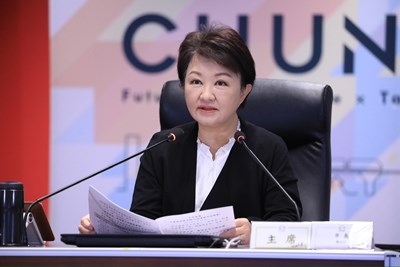
Mayor Lu noted that Taiwan is currently facing a shortage of water resources, and Taichung City has experienced a once-in-a-century flood. As such, finding ways to generate and secure more water resources is of utmost importance. She also mentioned that the development of sewer systems is a key indicator of a city’s level of modernization. To make this “invisible infrastructure” better, the city government continues to make concerted efforts in improving urban sanitation and reducing water pollution. Mayor Lu also expressed her appreciation for the personnel involved, recognizing them as the “invisible heroes of the city” whose contributions have significantly enhanced the quality of life for Taichung residents.
Mayor Lu pointed out that in Taichung City, industrial and domestic water usage has traditionally relied heavily on tap water, with some agricultural irrigation even drawing from the same source. This overreliance has, in past years, led to severe water shortages. To address this issue, the city must seek alternative sources and reallocate water where the use of tap water is not essential, such as for industrial processes or agricultural irrigation. Treated and purified wastewater can be used for these non-potable purposes, thereby reducing the demand for tap water in the industrial sector and reserving more potable water for residential use.
At today’s municipal meeting, Director Fan Shih-Yi of the Water Resources Bureau delivered a special report titled “Water Resources, New Perspectives, Water Cycle, Reuse.” He noted that in order to ensure a stable water supply for Taichung City, the city government is actively promoting water infrastructure projects grounded in the principles of water security, environmental sustainability, and water-related cultural preservation. It is estimated that, by 2027, the number of households connected to the sewage system is expected to reach 350,000. By 2035, the city aims to treat 220,000 tons of wastewater per day, producing 140,000 tons of reclaimed water daily. This reclaimed water will be supplied to the Central Taiwan Science Park, Taichung Port Industrial Zone, Houli District, and other areas. Director Fan also noted that the Shuinan Water Resources Recycling Center began operations in October last year and currently supplies 10,000 tons of reclaimed water per day to the Central Taiwan Science Park. The Futian Water Resources Recycling Center is expected to begin operations next year, providing 58,000 tons per day to the Taichung Port Industrial Zone. Additionally, the Fengyuan Water Resources Recycling Center is currently under planning and development.
Director Fan explained that in response to the increasing frequency of extreme weather events resulting in uneven patterns of drought and flooding, the Taichung City Government has proactively implemented strategies to stabilize the city’s water supply. Meanwhile, by utilizing reclaimed water for industrial purposes, the city has effectively enhanced the flexibility of water allocation for residential use. By prioritizing the use of reclaimed water for industrial applications, cleaner tap water can be reserved for domestic consumption, allowing for more resilient water management. In addition, the city government has integrated small-scale hydropower solutions. In July of last year, the Shishuike River Drainage Small Hydropower Plant commenced operations, utilizing water resource recycling facilities and related sites, thereby creating diverse and new utilities.
During the meeting, Mayor Lu also inquired about the current water conditions. Director Fan responded that the two major reservoirs in central Taiwan maintain healthy water levels. Liyutan Reservoir is currently at full capacity, and Techi Reservoir has reached 95% of its storage capacity. Typically, the period leading up to the end of May is the most critical time of year in terms of water resource availability. However, as of mid-April, this year’s water storage appears relatively optimistic. Mayor Lu nonetheless emphasized the importance of continued water conservation, urging the public to cherish every drop of this resource. She reminded citizens that even in times of abundance, water should not be wasted, and the hardships experienced during previous droughts must serve as a lesson to better prepare for the future. (4/15*17)*Water Resources Bureau
Contact Person: Water Resources Bureau, Taichung City Government
Contact Number: 04-22289111

 Facebook
Facebook
 Twitter
Twitter
 LINE
LINE